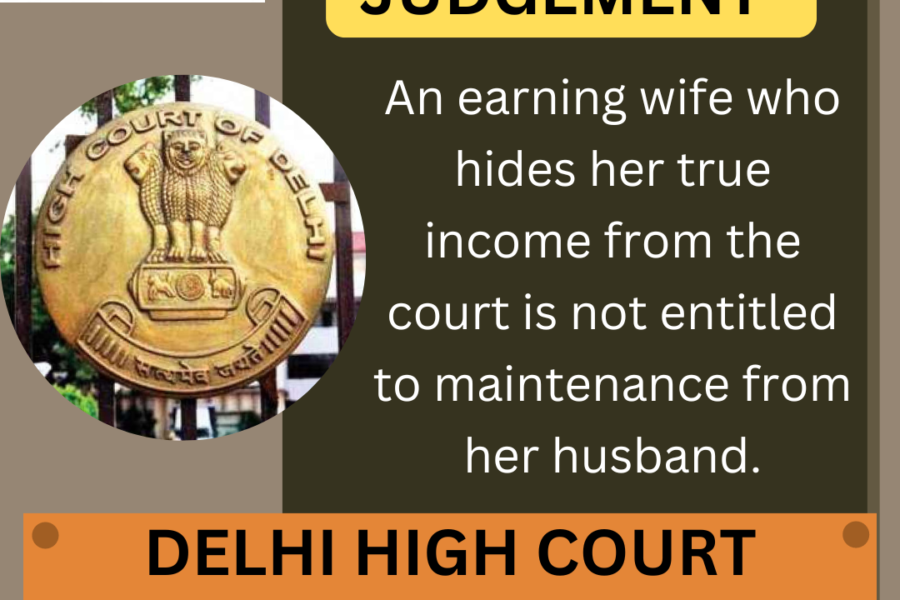ABC v. XYZ, 2023 – Del 5624, decided on 12-09-2023.
Delhi High Court:
The appellant’s wife had challenged the Principal Judge of the Family Court’s Order dated 03-09-2019, which dismissed her application for maintenance under Section 24 of the Hindu Marriage Act, 1955 (the “HMA”).
The Division Bench of Suresh Kumar Kait and Neena Bansal Krishna*, JJ., held that the appellant’s wife was not only highly qualified and capable of earning money, but that she had also been making money, albeit with an unwillingness to disclose it. The Court dismissed the appeal because it did not find any merit in it, stating that such a person could not be considered entitled to maintenance.
Background
The husband, respondent, filed a divorce petition under Section 13 (1)(ia) of the HMA after the parties in this case were unable to maintain their marriage due to incompatibility and disagreements. The couples were married on April 21, 2014. The wife had been employed up until that point, but on May 22, 2015, she resigned from her position following the filing of the divorce petition. After that, the divorce petition was withdrawn and the issue was resolved peacefully.
Nonetheless, the wife’s 2016 police complaint revealed that the couple could not agree on anything in their married life. The Family Court reexamined the case, noting the wife’s credentials and her continued employment following the marriage. declined to grant her any pendent lite maintenance. Being aggrieved by the same, the present appeal had been preferred by the wife who had sought interim maintenance of Rs.35,000 per month in addition to litigation expenses of Rs. 55,000.
Analysis, Law, and Decision The Court
noting that the wife was M. Phil when they got married and that she was working towards a Ph.D, which she had finished, giving her a Ph.D in management along with a professional certification in computers. Conversely, the spouse was merely a high school graduate. The court further mentioned that the woman was earning Rs. 12,000 a month at the time of her marriage while working at a Diamond Jewellery Showroom. In addition, she quit her work on May 22, 2015, due to her inability to report to work.
According to the Court’s opinion, the wife was not only extremely qualified but she was employed even before she got married. According to the Court, the Family Court had correctly noted that the wife had initially failed to disclose that she was working even if not regularly or for charity as claimed by her. The Court took note of the Family Court’s observation that it was hard to believe someone with her level of qualification would not be employed, and that it was even harder to believe she would be working for charity.
According to the Court’s opinion, “there was no doubt that a person must be forced to work simply because she was qualified, but in this case, the wife was not only qualified but had also been working.” There was no question that “capacity” and “actual earning” differed in this instance, but the wife’s employment history was made explicit in the document that was kept on file, not just her capability.
The Court relied on Mamta Jaiswal v. Rajesh Jaiswal, 2000 SCC OnLine MP 580, wherein it was observed that “Section 24 of the HMA had been enacted to provide monetary assistance to either spouse who was incapable of supporting himself or herself despite sincere efforts. However, the law did not anticipate that anyone involved in legal disputes would sit about merely hoping to extract money from the other side. The purpose of Section 24 of the HMA was not to establish an army of idlers waiting for the other spouse to grant them a dole.
The Court cited Rupali Gupta v. Rajat Gupta, 2016 SCC OnLine Del 5009, in which the Division Bench of this Court rejected a well-qualified spouse with earning potential’s claim for support under Section 24 of the HMA. Consequently, the Court decided that in this instance, the wife was not only extremely qualified and capable of earning money, but she had also been making money even though she had not been inclined to truthfully disclose her income.
The Court thus opined that such a person could not be held entitled to maintenance and, therefore, dismissed the appeal as it found no merit in it.

